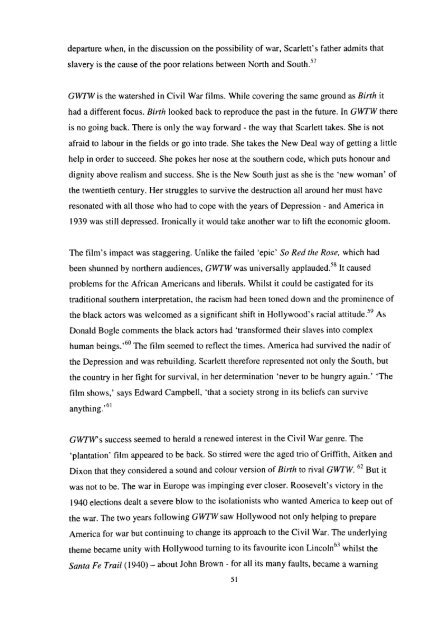Download (3483kB) - Greenwich Academic Literature Archive ...
Download (3483kB) - Greenwich Academic Literature Archive ...
Download (3483kB) - Greenwich Academic Literature Archive ...
- No tags were found...
Create successful ePaper yourself
Turn your PDF publications into a flip-book with our unique Google optimized e-Paper software.
departure when, in the discussion on the possibility of war, Scarlett's father admits thatslavery is the cause of the poor relations between North and South. 57GWTW is the watershed in Civil War films. While covering the same ground as Birth ithad a different focus. Birth looked back to reproduce the past in the future. In GWTW thereis no going back. There is only the way forward - the way that Scarlett takes. She is notafraid to labour in the fields or go into trade. She takes the New Deal way of getting a littlehelp in order to succeed. She pokes her nose at the southern code, which puts honour anddignity above realism and success. She is the New South just as she is the 'new woman' ofthe twentieth century. Her struggles to survive the destruction all around her must haveresonated with all those who had to cope with the years of Depression - and America in1939 was still depressed. Ironically it would take another war to lift the economic gloom.The film's impact was staggering. Unlike the failed 'epic' So Red the Rose, which hadbeen shunned by northern audiences, GWTW was universally applauded. 58 It causedproblems for the African Americans and liberals. Whilst it could be castigated for itstraditional southern interpretation, the racism had been toned down and the prominence ofthe black actors was welcomed as a significant shift in Hollywood's racial attitude/ AsDonald Bogle comments the black actors had 'transformed their slaves into complexhuman beings.' 60 The film seemed to reflect the times. America had survived the nadir ofthe Depression and was rebuilding. Scarlett therefore represented not only the South, butthe country in her fight for survival, in her determination 'never to be hungry again.' 'Thefilm shows,' says Edward Campbell, 'that a society strong in its beliefs can surviveanything.' 61GWTWs success seemed to herald a renewed interest in the Civil War genre. The'plantation' film appeared to be back. So stirred were the aged trio of Griffith, Aitken andDixon that they considered a sound and colour version of Birth to rival GWTW. 62 But itwas not to be. The war in Europe was impinging ever closer. Roosevelt's victory in the1940 elections dealt a severe blow to the isolationists who wanted America to keep out ofthe war. The two years following GWTW saw Hollywood not only helping to prepareAmerica for war but continuing to change its approach to the Civil War. The underlyingtheme became unity with Hollywood turning to its favourite icon Lincoln 63 whilst theSanta Fe Trail (1940) - about John Brown - for all its many faults, became a warning51
















